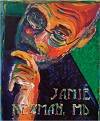Morbid fascination
Obesity is only one of many conditions that could be called morbid.
Many of our patients, as well as many of our colleagues, are considered obese. Under ICD-10, there is the general classification E66, with several subclassifications. E66 alone is not specific enough. There is E66.0, obesity due to excess calories, and E66.01, morbid (severe) obesity due to excess calories. It is essential not to forget E66.1, drug-induced obesity, as steroids can be responsible for obesity, and having steroid-induced obesity says something about one's underlying health issues. Surprisingly, there is no code for endocrine-related obesity, though any physician who has seen a severe case of untreated hypothyroidism can attest to its existence.

But wait, that's not all. There is also the classification of E66.2, morbid (severe) obesity with alveolar hypoventilation. However, in my mind, excess calories and hypoventilation are neither distinct nor mutually exclusive. Charles Dickens was aware of this, thus the condition has been referred to, although increasingly less commonly, as the Pickwick syndrome. In his 1836 novel, “The Posthumous Papers of the Pickwick Club,” Dickens describes a character who throughout the comic novel does little but eat or sleep. It is considered the first description of sleep apnea, or the more literary-sounding E66.2.
An elevated BMI sounds much more scientific. There are 26 BMI-themed ICD codes for adults, from below 19.9 kg/m2 to over 70 kg/m2. A BMI over 70 kg/m2 is nothing to sneeze at (unless you are allergic to demographic statistical nomenclature). But Z68.45, which designates a BMI in this category, is not sufficient to describe the variety of bodily habitus in our modern world. For perspective, a BMI of 70 kg/m2 would be a 5′6″ man of 440 pounds. I have cared for many patients who would match that description. But I've also seen patients who are 5′6″ and 650 pounds, which calculates to a BMI over 100 kg/m2. Clinically there is a significant difference between a patient with a BMI over 70 kg/m2 and a patient with one over 100 kg/m2, yet ICD-10 fails to take this into account. I have also seen a few patients with BMIs below 15 kg/m2, and they certainly are different than those with a BMI of 19 kg/m2. The good news is that ICD-11 is right around the corner.
A central question is why obesity, among all medical conditions, is the only one to capture the epithet of “morbid”? The expression only appears twice in 70,000 ICD codes, and both are “morbid (severe) obesity.” Is no other condition morbid? The term morbid primarily is an adjective describing an unhealthy or abnormal interest in a disturbing or unpleasant topic such as disease or death but can also be a characteristic of a disease. Its root is the Latin word morbidus, or diseased. Are we on our way to abandoning “morbid” in favor of “severe”? Has the time come for morbid to join such other medical terminology as “dropsy,” “ague,” and the impossible-to-pronounce “phthisis”?
Perhaps we should not give up on “morbid” quite yet. I predict that in the wonderful world of ICD-11 to come, codes will apply not just to our patients, but to the staff as well. This will allow a much more accurate measurement of patient experience and be a great tool for educators. For example, suppose you are working with a third-year IM resident who is completely unable to understand your concise, evidence- and experience-based suggestions for patient management. His obtuseness goes beyond the pale. It's E666.71, morbid obtusity. Of course the learner claims in his evaluation that you are unable to state anything clearly and that you mask your lack of clinical knowledge and familiarity with the literature behind a meaningless wall of words and outdated anecdotes unrelated to the case at hand. He codes you E666.81, morbid obfuscation. A medical student walks on the ward and you and the resident turn towards each other and sigh. It's a severe case of E666.03, morbid odiferousness.
I have had a morbid fascination with this subject for many years, and thankfully in the future I'll have a diagnosis to go with it—morbid curiosity.



